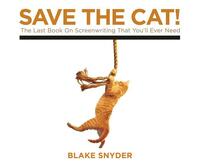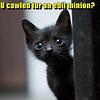Take a photo of a barcode or cover
I'm a novelist, not a screenwriter, but this book was worth it for the beat sheet, the explanation of the board, and the trouble shooting section.
Although this book is about screenwriting, the advice given is priceless even to little hobby-writers like myself. I just switched over to this after another "technical" (non-fiction or story) book that I was very bored with, thinking I must not be fit to read these more serious books, but Save the Cat showed me that it's not on me. The style of writing is deeply engaging, it was easy to read and kept my attention. There were lots of examples, even from films that I have seen and know well, so it was also easy to relate to. I have no intention to go into screenwriting or even professional writing, but definitely going to try and use these tips for my next story (and try not to mass-delete all the ones I made so far that just don't measure up).
Dated but interesting. Some advice doesn’t hold up in the age of the Internet and streaming, but I think a lot of it would be very helpful to a beginner screenwriter. If I ever decide to write a screenplay, I’ll refer back to it.
I wholeheartedly recommend this book for fiction writers as well, so you can learn how to apply these screenwriting tips to make your stories as compelling and engaging as the best Hollywood had to offer.
An enjoyable read with conversational style and packed with great nuggets.
An enjoyable read with conversational style and packed with great nuggets.
a fascinating book about about self-promotion before the internet. an interesting book about movie structure. an annoying book about commercialism as a form of self expression
My writing group assigned this as reading and I borrowed the book from the library when I saw what the kindle price was. (Over $11 - really? with the paperback less than $2 more?)
The price is indicative of the self-absorbed importance Mr. Snyder shows throughout the how-to book, even if the price is likely assigned by the publication company. I'm not paying $11.57 for a 12-year old book. And I am glad I made this decision.
While the book is filled with excellent writing advice - specifically aimed at writing a FORMULAIC BLOCKBUSTER for maximum money - the limited scope of the end-product and the underlying sexism pulls this back from wide-spread use. (Additional Note: Towards the very end the author mentions the bidding wars on spec screenplay which made him rich no longer exist in Hollywood, so the marketing advice he provides no longer applies. The writing advice still applies for the Formulaic Blockbuster.)
Putting together the perfect logline (or 'elevator pitch' as the writing community calls it) is a must read, and half of the book is devoted to this. If you haven't figured out how to create a good pitch yet for your book (or screenplay), take advantage the tutorial.
The Board is something I am going to try with my short stories, which run about the same length as a movie script, to see how well it works. Many authors swear by their Boards, but I've never tried them before.
The sexism is the small, underlying, insidious things found throughout Hollywood humor. Mr. Snyder specializes in comedy, so the inherent nit-picks I experienced were not unexpected. Recommended directors, all male. Strong female movie examples - Pretty Woman, Miss Congeniality, and Legally Blonde. Male movies are stuff like Die Hard. Romances are described as buddy movies where one of the "wears a skirt" - true and an example which sticks with you, but made my teeth ache. Part of it is the material available out of Hollywood - they go for the simple sexist joke and wink at the screen saying (yeah it's sexist, but because we and you know it's sexist, that is part of the joke and makes it not sexist ... yeah, no, this is getting tired - like having African Americans being the crazy partner in 80's movies - see we are giving them the same screen time, happy now?) No, I'm not happy and reading this book made me have several non-happy moments.
End-result, helpful read but limited in application in part because of its aim (BLOCKBUSTERS!!!) and in part by the writer (COMEDIC BLOCKBUSTERS!!!) and in part by the atmosphere/society which shaped the writer (BLOCKBUSTERS FOR HOLLYWOOD!!!) - oh, watch out for the exclamation points.
The price is indicative of the self-absorbed importance Mr. Snyder shows throughout the how-to book, even if the price is likely assigned by the publication company. I'm not paying $11.57 for a 12-year old book. And I am glad I made this decision.
While the book is filled with excellent writing advice - specifically aimed at writing a FORMULAIC BLOCKBUSTER for maximum money - the limited scope of the end-product and the underlying sexism pulls this back from wide-spread use. (Additional Note: Towards the very end the author mentions the bidding wars on spec screenplay which made him rich no longer exist in Hollywood, so the marketing advice he provides no longer applies. The writing advice still applies for the Formulaic Blockbuster.)
Putting together the perfect logline (or 'elevator pitch' as the writing community calls it) is a must read, and half of the book is devoted to this. If you haven't figured out how to create a good pitch yet for your book (or screenplay), take advantage the tutorial.
The Board is something I am going to try with my short stories, which run about the same length as a movie script, to see how well it works. Many authors swear by their Boards, but I've never tried them before.
The sexism is the small, underlying, insidious things found throughout Hollywood humor. Mr. Snyder specializes in comedy, so the inherent nit-picks I experienced were not unexpected. Recommended directors, all male. Strong female movie examples - Pretty Woman, Miss Congeniality, and Legally Blonde. Male movies are stuff like Die Hard. Romances are described as buddy movies where one of the "wears a skirt" - true and an example which sticks with you, but made my teeth ache. Part of it is the material available out of Hollywood - they go for the simple sexist joke and wink at the screen saying (yeah it's sexist, but because we and you know it's sexist, that is part of the joke and makes it not sexist ... yeah, no, this is getting tired - like having African Americans being the crazy partner in 80's movies - see we are giving them the same screen time, happy now?) No, I'm not happy and reading this book made me have several non-happy moments.
End-result, helpful read but limited in application in part because of its aim (BLOCKBUSTERS!!!) and in part by the writer (COMEDIC BLOCKBUSTERS!!!) and in part by the atmosphere/society which shaped the writer (BLOCKBUSTERS FOR HOLLYWOOD!!!) - oh, watch out for the exclamation points.
Great book if you want to learn the basis of crafting a a well structured story for the movies (or any story).
Barely any cats.
For real tho, want to write a script? Read this book. Simple steps makes it feel like anyone can do it (spoiler: anyone can do it)
For real tho, want to write a script? Read this book. Simple steps makes it feel like anyone can do it (spoiler: anyone can do it)
I have read SO MANY screenwriting books (and yet only written one feature length screenplay in my life). This was a pretty exceptional addition to my screenwriting library. It really seems to turn the process into a paint by numbers, but, ya know, you still get to be creative and not as prescriptive as all that...but kind of prescriptive, because screenwriting is all about structure. I may update my review after I try it. But you can take one thing away from the fact that I've read a million and one books on screenwriting and written very little: I am a procrastinator. Reading books about screenwriting makes me feel like I'm working on my script. Any screenwriter will tell you their various expert ways that they deceive themselves into feeling productive while actually procrastinating. Reading books about screenwriting is mine. And the reason I procrastinate is because, well, the whole thing just feels so huge. It's like looking at the Ol' 96'er in The Great Outdoors and thinking "I can't possibly eat that whole thing!" And maybe you can't, but you can take the first bite, and then the next one, and the next one. And in the end you might have the dubious honor of having eaten more steak than any person should. Snyder teaches you how to take the bites of the script. Each chapter is basically a task. Do this task, then move on to the next task. If you follow it, you'll likely have a script at the end. Whether or not it's a quality script still falls on you, though.





